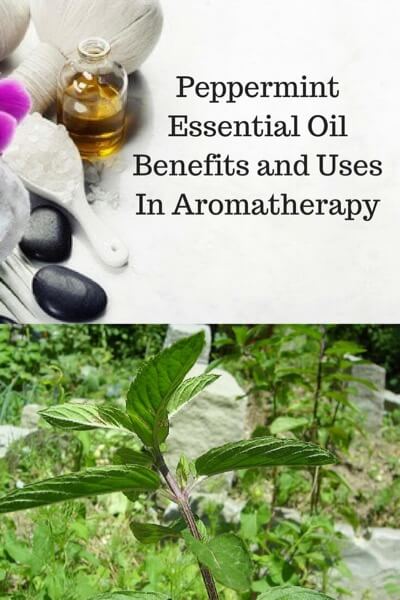- Home
- Essential Oil Profiles
- Peppermint Essential Oil
As an affiliate for Bookshop, Amazon, and other programs, I may earn a small commission for products purchased through links. This doesn't affect the price you pay. Privacy policy and disclosures.
Search this site:
Guide to Peppermint Essential Oil Benefits and Uses
"Peppermint raises the spirit to fuller understanding and appreciation of the mysteries that will eventually fully unfold to us," writes aromatherapist Valerie Ann Worwood in Aromatherapy For the Soul. She also says peppermint essential oil (Mentha piperita) stimulates and soothes, uplifts and calms. The oil's emotional benefits are to encourage regeneration, self-acceptance, concentration, vitality, and vibrancy.

Basic Peppermint Facts
Plant family: Lamiaceae/Labiatae
Production: Steam distilled from the leaves and stem of the plant, which is a creeping herb.
Aroma: Minty, slightly camphor-like.
Perfume/Aromatic note: Top
Is peppermint safe to use during pregnancy? Conflicting information is available. Aromatherapy and Massage for Mother and Baby doesn't include peppermint as an oil to use but also does not list it as one to avoid. Consult a professional.
Is peppermint oil safe for children? Do not use on or near the faces of children under age 2, according to Essential Oil Safety. Some sources recommend not using this essential oil with children under the age of 3 to 6 years.
Cautions: Do not use if you have cardiac fibrillation or G6PD deficiency, according to Essential Oil Safety. Also, the essential oil can cause a burning sensation and will irritate eyes if used close to them. Not compatible with homeopathic remedies.
Main components:
- (–)-menthol 19.0–54.2%
- menthone 8.0–31.6%
- (–)-menthyl acetate 2.1–10.6%
- neomenthol 2.6–10.0%
- 1.8-cineol 2.9–9.7%
Source: Essential Oil Safety, 2nd Ed.
Peppermint Aromatherapy Benefits
Aromatherapy: A Complete Guide to the Healing Art: Peppermint clears sinuses, reduces nausea, helps relieve headaches and other types of pain, may enhance digestion, and stimulates the skin's oil production. "Peppermint oil's dual hot and cold action accentuates the warming sensation in liniments."
The Heart of Aromatherapy: Peppermint clears congestion, soothes sore muscles and joints, supports digestion, eases nausea, uplifts and energizes, and focuses and sharpens the mind.
The Complete Book of Essential Oils and Aromatherapy: Uses for peppermint essential oil include helping relieve digestive problems, sinus congestion, headache, muscle aches and pains, menstrual cramps, tension, fatigue, and apathy.
The Encyclopedia of Essential Oils (updated edition): Peppermint may help relieve muscle pain, neuralgia, sinusitis, spasmodic cough, indigestion, flatulence, nausea, colds and flu, headaches and migraines, fatigue, nervous stress, and vertigo.
Aromatherapy For Healing the Spirit: Traditional Chinese Medicine views peppermint oil as energetically cool and dry. It circulates Qi-energy, clears hot phlegm, and stimulates the nerves and brain. The oil is useful for colds and flu that involve strong fever, sore throat, and headache. Peppermint stimulates the flow of Qi-energy in the Stomach and intestines, making this essential oil one of the best for the digestive system.
Aromatica: A Clinical Guide to Essential Oil Therapeutics, Volume I: Psychologically, peppermint promotes motivation, self-confidence, alertness, and emotional renewal. Physically, the essential oil restores and stimulates hypotonic/weak conditions. In Traditional Chinese Medicine the essential function of the oil is to activate the Qi, raise the Yang, and strengthen the Shen.
- The rasa (taste) of peppermint is pungent, the vipaka (aftertaste) is pungent, and the virya (energy) is cooling and moisturizing. (Marma Points of Ayurveda describes the rasa as sweet, pungent, astringent and the vipaka as sweet.)
- The oil decreases pitta and kapha and has no effect on vata. (Marma Points of Ayurveda states the oil balances all three doshas.)
- Tissues most affected by the oil are plasma, blood, marrow, nerves, gums, gastrointestinal, and skin.
- Indications for this essential oil include colds, fever, sore throat, laryngitis, earache, digestive upset, nervous agitation, headache, painful menstruation, and asthma.
Subtle Aromatherapy: Peppermint acts on the ego, both getting rid of pride and helping you overcome feelings of inferiority.
The Essential Guide to Aromatherapy and Vibrational Healing: Spiritually, peppermint can keep you alert during mediation and is useful for regression therapy, rebirthing, and other practices that use breathwork. Mentally, the essential oil wakes you up and stimulates clarity and focus. Emotionally, use the oil to help you sort out your feelings.
Aromatherapy and Subtle Energy Techniques: Peppermint essential oil uplifts, awakens, refreshes, and revitalizes. The oil is especially useful for the sixth chakra to stimulate the conscious mind and promote clear perception.
Mixing Essential Oils for Magic: Peppermint stimulates the mind, bringing clarity and focus and promoting creativity and inspiration. The oil strengthens psychic awareness, divination skills, and prophetic dreaming. Use this essential oil to purify; attract money, luck, and love; and banish negative energy.
Peppermint Essential Oil Uses and Blends
To use peppermint to support digestion and reduce gas, cramping, and nausea, make a massage oil and use it on the abdomen.
Some studies have suggested taking enteric-coated peppermint oil capsules helps some people manage IBS symptoms
Hair Treatment
To use peppermint oil for hair, you can add a few drops to a bottle
of unscented natural shampoo. For a hair treatment to support hair
growth, use this blend:
- 4 tablespoons jojoba oil
- 4 drops peppermint
- 4 drops rosemary essential oil
Massage a little into your hair, let set for at least 10 minutes, and then shampoo as usual.
Peppermint Essential Oil Blends for Health
To use peppermint oil for headaches, dilute the essential oil in a carrier oil and massage the back of your neck. Use peppermint alone or combine it with another headache-relieving essential oil, such as lavender, rosemary, or basil. Another option is to use peppermint in an inhaler or diffuser.
Diffuser Blend for Headaches
- 2 drops peppermint essential oil
- 2 drops palo santo essential oil
- 2 drops spearmint essential oil
Diffusing peppermint oil can also clear your sinuses; reduce feelings of irritability, nervous tension, or stress; and promote focus
Diffuser Blend for Focus
- 2 drops peppermint
- 2 drops cinnamon essential oil
- 1 drop rosemary essential oil
Source: New Directions Aromatics
Easy Breathing Oil
- 2 drops peppermint
- 2 drops eucalyptus essential oil
- 4 drops roman chamomile essential oil
- 4 drops spruce essential oil
- 1 tablespoon carrier oil
Blend ingredients in a small dark bottle. Rub a little of the blend on chest as needed.
Source: Floracopeia
Uses of Peppermint Essential Oil Around the House
Peppermint is a great addition to aromatherapy cleaning products.
Room Cleansing Spray
For a room spray, combine the following ingredients in a spray bottle:
- 1/2 cup distilled water
- 30 drops bergamot essential oil
- 25 drops lemon essential oil
- 5 drops peppermint essential oil
Shake well before each use to mix the water and oils. Spray into the air, avoiding any delicate fabrics.
Source: Pure Scents for Well Being
Repel Insects
Some people believe peppermint is a more effective insect repellent than citronella when used on the body. Blend peppermint essential oil with a carrier oil and apply to your body.
Peppermint may repel ants, cockroaches, and mice, according to Essential Oils & Aromatherapy for Dummies. However, using
peppermint oil for mice and pests is more likely to work for keeping new
ones out than for getting rid of ones already in your home.
To help keep bugs out of the house, try this spray:
- 1/2 teaspoon eucalyptus essential oil
- 1/4 teaspoon peppermint essential oil
- 1/4 teaspoon lemon essential oil
- 4 ounces vinegar
Blend all ingredients in a spray bottle. Shake well before each use, and spray where bugs tend to enter the house.
To repel ants or mice, another option is to cut a sponge into small squares. Place a few drops of peppermint oil on each square, and place the squares in the corners of cupboards or places where ants or mice enter. Add more oil once a week.
Buy essential oils: Aromatics International or Rocky Mountain Essential Oils.
Photo Credit: Simon Eugster, CC BY-SA 3.0 via Wikimedia Commons



